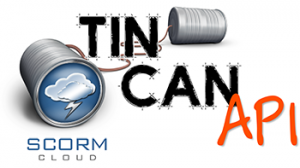Posts Tagged ‘SCORM’
Per the Dan Marsden blog:
I spent a lot of time discussing the opportunity to run a crowd-funded project to complete SCORM 2004 in Moodle but it’s hard to define a fixed figure that would allow us to complete the project and I wonder if such a large amount of my time could be spent on projects that are more current.
Full support for SCORM 2004 is already available in Moodle by using the Rustici SCORM cloud plugin for Moodle and I think it is more cost-effective to purchase a subscription to their hosted solution which is much more stable/reliable and feature rich than what we could provide directly in Moodle anyway.

Back before TinCan, you could make a SCORMCloud API call like this:
http://cloud.scorm.com/api?method=rustici.registration.getLaunchHistory &appid=myappid®id=myreg001
and you get a nice XML document like this:
<launchhistory regid="e222daf6-6005-4344-a07e-0aaa46b21dc9">
<launch id="c7f31a43-706a-4f43-8ab9-ebbf0dde4cbc">
<completion>complete</completion>
<satisfaction>failed</satisfaction>
<measure_status>1</measure_status>
<normalized_measure>0.2</normalized_measure>
<experienced_duration_tracked>2628</experienced_duration_tracked>
<launch_time>2011-04-05T19:06:37.780+0000</launch_time>
<exit_time>2011-04-05T19:07:06.616+0000</exit_time>
<update_dt>2011-04-05T19:07:06.616+0000</update_dt>
</launch>
<launch id="fc80087b-0fde-4263-8a89-29bee96eb65a">
<completion>unknown</completion>
<satisfaction>unknown</satisfaction>
<measure_status>0</measure_status>
<normalized_measure>0.0</normalized_measure>
<experienced_duration_tracked>2628</experienced_duration_tracked>
<launch_time>2011-04-05T19:15:51.177+0000</launch_time>
<exit_time>2011-04-05T19:15:59.450+0000</exit_time>
<update_dt>2011-04-05T19:15:59.450+0000</update_dt>
</launch>
<launch id="ffd2d304-439c-4c59-8be8-5d3fc1eb3f92">
<completion>complete</completion>
<satisfaction>failed</satisfaction>
<measure_status>1</measure_status>
<normalized_measure>0.27</normalized_measure>
<experienced_duration_tracked>10223</experienced_duration_tracked>
<launch_time>2011-04-05T19:16:07.214+0000</launch_time>
<exit_time>2011-04-05T19:17:25.294+0000</exit_time>
<update_dt>2011-04-05T19:17:25.294+0000</update_dt>
</launch>
</launchhistory>
If you been loading TinCan courses into SCORMCloud, you may have noticed that you no longer get any data from this!!!!
For example, we now just get this:
"<?xml version='1.0' encoding='UTF-8'?>\n<rsp stat='ok'><launchhistory regid='DiabetischeNeuropathied648d063-05b7-43e3-8b67-57568e329f4a-f59356563f5fd7e6104fe03d870c5007' /></rsp>"
So what’s the story? A lurking TinCan-ism that doesn’t match to SCORM? Probably.
So here’s the response from support.scorm.com ….
The Launch history, as it lives today, is focused around the SCORM API calls that are made by the content. Because the SCORM API is part of the SCORM player we have an opportunity to record those calls at the time they happen and format them into a readable log. For TinCan there is no player. This is a boon for content creators because it gives them far more freedom with their content than SCORM did but it has some limitations.
Those limitations all exist around the lack of a player for tinCan content. TinCan content exists in the browser outside of a player and sends statements back to some endpoint via existing http protocols which can’t be intercepted.
What this means is that you have two “views” of what might be considered launch history:
1) Statement Viewer – Statement viewer can show you all of the statements related to a registration. This represents all of the communication between the content and the ScormEngine that was *saved*. The only exception for this would be the state (replacement of suspend data) data which we only save the most recent value and don’t display in the statement viewer.
2) Browser Debug tools – Obviously these tools are only going to be useful when you’re testing a course live but they will provide more information than the statement viewer. Because all communication in TinCan will be handles by simple HTTP POSTS, PUTS and GETS you should be able to see all the successful and unsuccessful API calls including Statements and State.
This sort of illustrates what I’ve been saying to a few customers. If you don’t have a good reason to publish your course packages in TinCan format, SCORM packages will be a smoother landing, at least for the time being. There are a few reason for this….

Poor SCORM. Its a bit of an elearning standards whipping boy, but the reality is it works (mostly).
I say mostly because if you have a dodgy network connection, it might not work too well actually.
We have a prospect for Bright who is looking to “syndicate” their content and this is an interesting use case for Bright and we do this quite well.
But while I was discussing it with them, I got to say something really nice about SCORM that I want to share:
“So I’d say if you want a semi-easy path to content syndication, SCORM packages are actually a good solution (I finally got to say something good about SCORM), because it completely encapsulates the course and it can now be dropped into any SCORM compliant container.”
Thank you SCORM!
-bret

Its nice when other people recognize what you do…
I had a chance to ask a potential customer who came knocking at our door how he heard about us?
“Oh you guys are listed here!”:
SCORM Cloud plugin for WordPress on scorm.com.
That’s nice, what did they say?
“These partners have done great work with the SCORM Cloud plugin and may be helpful for you:
Aura Software”
Why thank you! And that was BEFORE we built Bright. 🙂